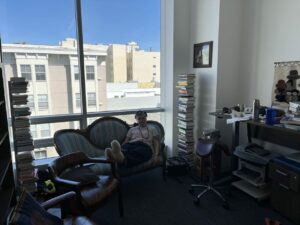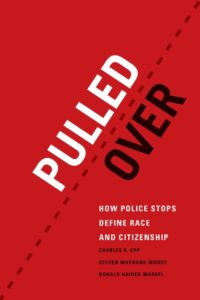
The process and aftermath of yesterday’s Op-Ed in the Los Angeles Times reminded me that some aspects of my job are not as transparent as teaching in the classroom and worth explaining a bit more. Academics do many things beyond teaching: publishing, committee work, conferences/meetings. Some of us also do policy work, some of us with law degrees litigate pro bono, and some of us appear on the media as analysts and experts. Much of this work is either unpaid or underpaid–whether or not that’s justifiable is hotly debated.
Writing op-eds has made my other writing (academic and popular) better, because it teaches two important skills: relevance and parsimony. Op-eds are time-sensitive and must address an issue on the news. They are also restricted in length (aim for about 800 words), and getting them to the sweet spot between gravitas and brevity often requires a productive cooperation between author and editors. Happily, I’ve had great experiences writing op-eds for the Chron, the L.A. Times, and the Daily Journal, among other outlets, which taught me to be as snippy as I can in the first draft, lest something I’m fond of ends up cut in the edits.
Even with these caveats, sometimes important clarifying information gets left out, which is a bummer, and sometimes inaccuracies slip in–which means you have to find a way to let that go after the thing is already in print.
What is somewhat of a new phenomenon, or certainly exacerbated over the last few years, is the extent to which an op-ed generates a lot of feedback addressed directly to the author (as opposed to a letter to the editor or somesuch). With a topic like the Manson family that’s to be expected–even fifty-five years after the fact, these cases still provoke a lot of strong emotions–but I am somewhat taken aback by the expectations and entitlement of complete strangers. I suspect the Internet is to blame; it has laudably democratized the public square, but it’s also significantly lowered the thresholds of basic decorum and restraint, and with the general erosion of public discourse, I suppose it’s inevitable.
Yesterday’s op-ed yielded two curious and more-or-less politely worded messages, one of which included a request that I call the person (with their phone included!) to discuss my philosophy of punishment and the other was an actual call placed to my cellphone with a request to call back (!!!), and three exemplars of hateful drivel (one of them truly vile–you know who you are, bud.) I skim all these things to figure out whether it’s a police matter or random viciousness; this time, I’m relieved to say, it was the latter. I have some questions.
To the folks who write politely or semi-politely and leave a phone number: Thanks for your interest in my op-ed and for not threatening to kill/rape me (it’s not a high bar). Pals, do you truly expect a complete stranger, whom you’ve contacted out of the blue, to call you and discuss what they wrote in the op-ed? Do you believe that the author owes you this time and effort? If so, why? Do you think the author gets paid to return calls to random strangers throughout the country to discuss their writing? If so, who do you think pays for this? When you don’t get a call back, are you disappointed? Are you looking for more intellectual stimulation and being proactive about it in a weird and somewhat inappropriate way? If so, that’s weirdly heartwarming, and may I recommend reading some of my books (here they are) instead of seeking an awkward phone conversation?
More importantly, i’m deeply curious about the hate mail authors. They often come in the early hours of the morning, which suggests that they come from people who read the print edition of the paper or from people who get up early on weekdays and weekends but have plenty of time to kill (I used to get the vilest emails after early-morning CBS-5 appearances.) Some of them suggest the person read the op-ed; some suggest they didn’t – just skimmed the headline and googled me. If you’re the author of vile hate mail, I have some questions, and perhaps you can indulge me:
What sort of person are you? Do you wake up early in the morning excited about writing vicious things to complete strangers? Do you approach the paper strategically, looking for people to attack, or do you just let the spirit move you? Are you proud of this behavior? Do you tell people (e.g., your spouse if you have one) you do this, or is it just your little secret? Do you get a thrill out of the prospect of upsetting the addressee, or do you just unburden yourself and not think of the recipient’s reaction at all? If the person told you their father was critically ill in hospital and was anxious and upset when receiving your message, would you feel contrition, schadenfreude, or something in between? And how does this habit harmonize (or not) with the rest of your life? Do you also get into road rage incidents? Problems at work? Are you verbally or physically abusive of your family members? What does it feel like to walk around with so much rage in you? Aren’t you worried about getting a heart attack?
Most importantly, to everyone: It’s the newspaper. If you read something you dislike, you have choices that do not include pursuing the author. You can discuss the article with your friends and family, or you could just move on. There’s always tomorrow’s news.
Yours truly,
Your local small-time public intellectual




No comment yet, add your voice below!